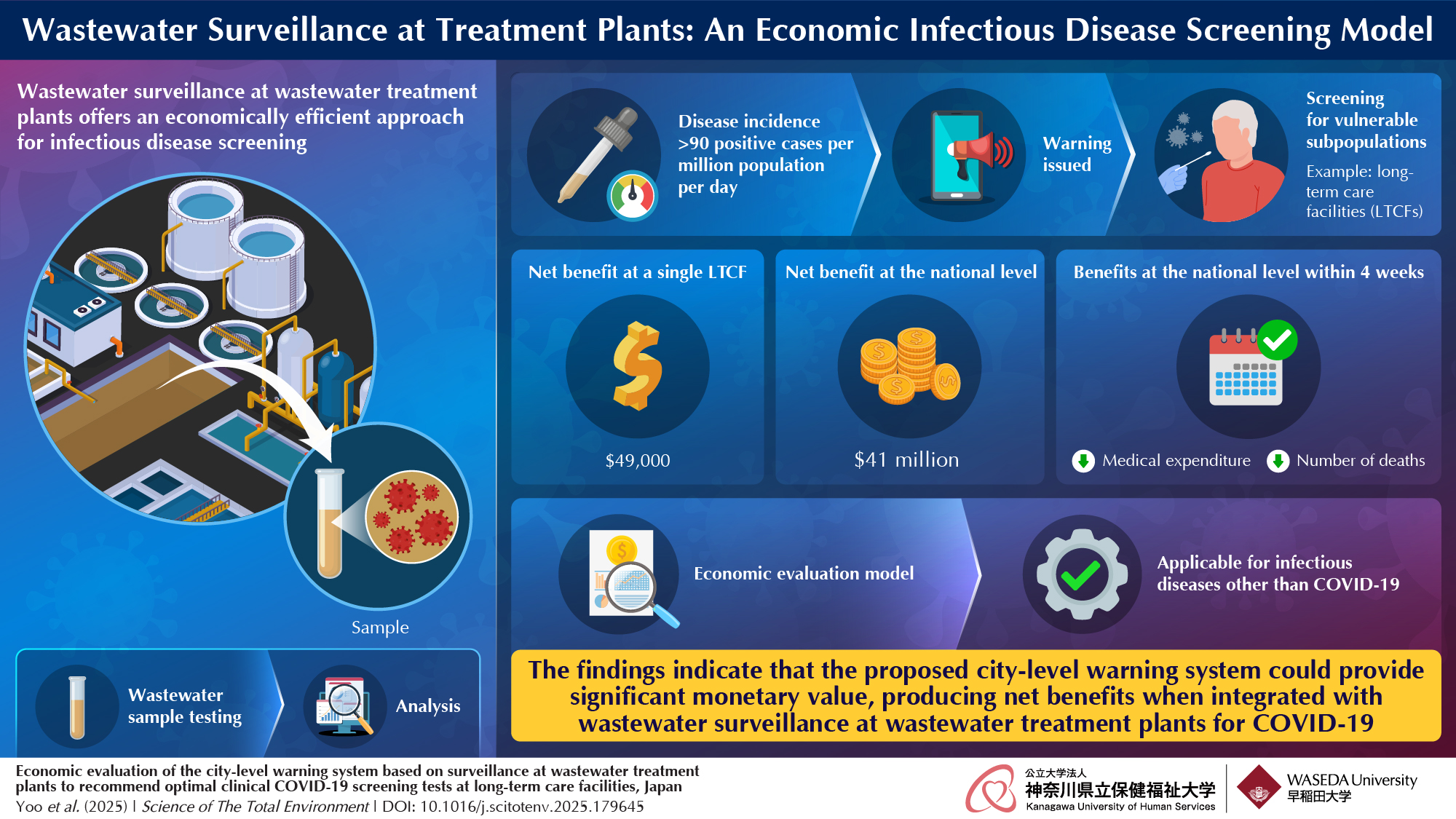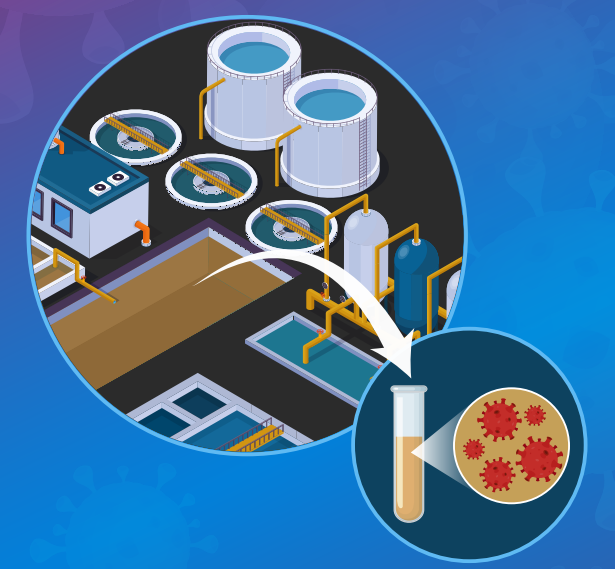Economic Evaluation of Wastewater Surveillance for COVID-19 Testing in Long-Term Care Settings
Wed, Jul 30, 2025-
Tags
Economic Evaluation of Wastewater Surveillance for COVID-19 Testing in Long-Term Care Settings
Early detection through wastewater surveillance could generate net benefits of $41 million in 4 weeks
Wastewater surveillance at treatment plants offers a low-cost, early warning method for detecting COVID-19. Researchers in Japan conducted an economic evaluation of a system for long-term care facilities that combines wastewater data with clinical testing thresholds to guide timely interventions. Their findings show that this approach could generate significant healthcare savings and improve outbreak response. The study supports wastewater surveillance as a scalable, cost-effective strategy for enhancing pandemic preparedness in vulnerable populations.

Image title: Wastewater Treatment Plants: An Economic infectious Disease Screening Model
Image caption: Researchers have proposed a warning system based on wastewater surveillance with incremental the economic and financial benefits
Image credit: Byung-Kwang Yoo, Waseda University and Kanagawa University of Human Services
License type: Original content
Usage restrictions: Cannot be reused without permission
The COVID-19 pandemic has placed enormous pressure on healthcare systems and economies around the world, with particularly severe impacts on vulnerable groups like residents of long-term care facilities (LTCFs). One key lesson from the pandemic is that early detection and treatment can lower hospitalization and death rates while also cutting medical costs. Wastewater surveillance at treatment plants (WSTPs) has emerged as a low-cost and innovative method to detect outbreaks early. Many developed countries have adopted this approach, but Japan has been slow to do so.
To promote the adoption of the WSTP system in Japan, a group of researchers led by Professor Byung-Kwang Yoo, Faculty of Human Sciences, Waseda University, Japan, and Professor Masaaki Kitajima, Research Center for Water Environment Technology, The University of Tokyo, conducted an economic evaluation of a city-level warning system based on wastewater data. Their findings were made available online on June 18, 2025, and will be published in Volume 990 of the journal Science of The Total Environment on August 15, 2025.
“Our proposed warning system seems reasonably feasible when compared to a similar ongoing successful wastewater surveillance system for polio in the UK. This UK system actually detected poliovirus at an earlier time, enabling a rapid public health response such as enhanced clinical tests and vaccine campaigns among a high-risk subpopulation,” explains Yoo.
According to their proposed system, when the number of newly reported COVID-19 cases exceeds a threshold of 90 newly reported clinically positive cases per million residents per day in a city where an LTCF is located, a warning will be issued by the city government recommending weekly clinical screening tests at LTCFs. Yoo notes, “Early detection and treatment of infected individuals contribute to lower hospitalization rates, lower mortality rates, and reduced medical expenses.”
The researchers used simulations to estimate how much financial benefit this system could offer. “Wastewater surveillance conducted at treatment plants was simulated to generate net benefits of around $5,000–$49,000 at a single LTCF, which encompasses 100 residents and 60 staff members, and around $3.5-$41 million at the national level in Japan during 4 weeks with a high incidence of COVID-19 infection,” says Yoo. “We hope these findings increase the support for WSTPs as well as the proposed warning system in Japan. This is because another study of ours reported that the general adult population in Japan is willing to pay $497 million annually for hypothetical WSTPs targeting COVID-19 and other diseases.”
Compared to clinical surveillance—which requires collecting individual patient samples—wastewater surveillance offers broader coverage, earlier outbreak detection, and lower costs. Yoo adds, “Since one wastewater sample easily allows us to test multiple pathogens together, an additional implication is to expand the scope of target pathogens, which will decrease the test cost per pathogen as well as increase the benefit per sample. Such target candidates include polio and influenza, which were already implemented in Japan on a small scale.”
As the world prepares for future public health challenges, cost-effective and scalable solutions like wastewater surveillance are essential. The present research is a crucial step toward evidence-based policy decisions and encourages a broader adoption of this approach in Japan and beyond.
Reference
Authors:Byung-Kwang Yooa, b, Ryo Iwamotoc, d, Ungil Chungb, e, Tomoko Sasakif, Peter G. Szilagyig, and Masaaki Kitajimah
Title of original paper: Economic evaluation of the city-level warning system based on surveillance at wastewater treatment plants to recommend optimal clinical COVID-19 screening tests at long-term care facilities, Japan
Journal: Science of The Total Environment
DOI:10.1016/j.scitotenv.2025.179645
Affiliations:aFaculty of Human Sciences, School of Human Sciences, Waseda University
bSchool of Health Innovation, Kanagawa University of Human Services
cSHIONOGI & Co., Ltd.
dAdvanSentinel Inc.
eGraduate Schools of Engineering and Medicine, The University of Tokyo
fKanagawa University of Human Services
gDepartment of Pediatrics, David Geffen School of Medicine, University of California, Los Angeles
hResearch Center for Water Environment Technology, School of Engineering, The University of Tokyo
About Professor Byung-Kwang Yoo
Dr. Byung-Kwang Yoo is a Professor at the Faculty of Human Sciences, School of Human Sciences, Waseda University, and also affiliated with the School of Health Innovation, Kanagawa University of Human Services. He holds a PhD in Health Policy and Management (Health Economics) from Johns Hopkins University, an M.Sc. from Harvard University, and an MD from Hokkaido University. With over 20 years of academic experience, his research focuses on health economics, public health responses to pandemics, and health promotion education with theater techniques. He is also the author of several widely recognized health policy books in Japan.














